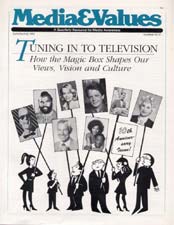MINORITIES: TV Stereotypes Ignore Dramas Of Life
|
This article originally appeared in Issue# 40-41
|
The media analysts are right. Television may be "the major educating and socializing institution in America." So what does it teach about minorities?
TV news offers glimpses into minority life and spotlights selected minority figures. At the same time, through movies and weekly series, fictional television provides a national peep show into an imagined multiracial America.
Over the years, television has featured four main types of minority characters — criminals, crime fighters, hustlers and family members, often comical or even bumbling.
TV teaches that racially complex America, particularly urban America, can be tough, dangerous, even deadly. It can be so in Miami, as seen on Miami Vice, where a multiracial vice squad, headed by a Latino, wages war against black pimps, Latino drug dealers, Asian smugglers and white killers. Minorities also lined up on both sides of the law-and-order struggle in TV's American Everycity of Hill Street Blues. But whether as lawbreakers or law enforcers, TV minorities are experts in violence.
Some minority "good guys" operate on the fringes of the law, like the ominous Hawk in Spenser: For Hire. While whipping criminals and effecting justice (as he determines it), Hawk projects an aura of barely controlled violence (as well as a deep-seated distrust of white society).
To get by in America, TV minorities have learned to hustle. Kingfish and his Amos 'n' Andy pals would hustle anyone for a quick and dirty buck. The same goes for Chico (despite The Man) and both Sanford and Son. And now we have L.A. Law's slick, sly Victor Sifuentes, the ultimate courtroom con man, though still in touch with his principles.
And what about minorities as family folks, TV's living proof that they have arrived? Julia (Diahann Carroll), The Jeffersons, and now Bill Cosby spread the lesson that blacks can make it economically, if they just try hard enough. Sometimes minorities even achieve social integration. After all, hot-tempered, English-garbling Cuban bandleader Ricky Ricardo (Desi Arnaz) had an Anglo wife (Lucille Ball).
But something's missing. According to most fictional TV, minority poverty seems to be a thing of the past. Likewise, the problems of prejudice and discrimination. The Great Society has arrived. Who needs affirmative action? But the real people who get up and go to work, struggle to raise their families decently, and are neither affluent nor crooks - those we never get to see...
So there you have it...fictional TV's multiracial America. With discrimination and poverty now part of history, Americans can live comfortably ever after...as long as they keep their eyes and ears open for minority crooks, hustlers, and violent cops. And the other real minorities — the ones who are living lives that include watching their criminal and big-bucks counterparts on television — stay invisible on their side of the screen.



